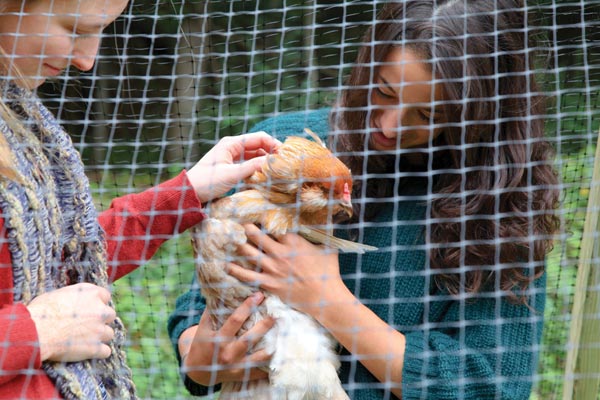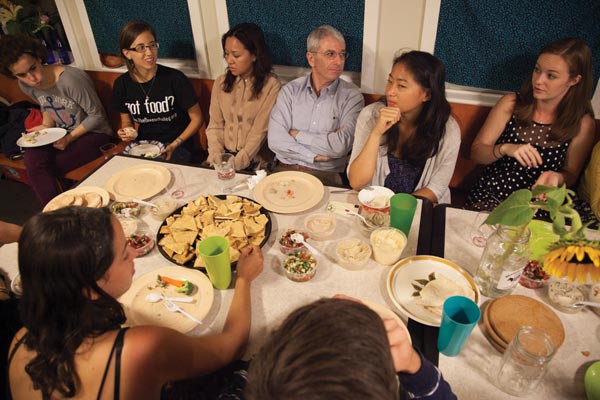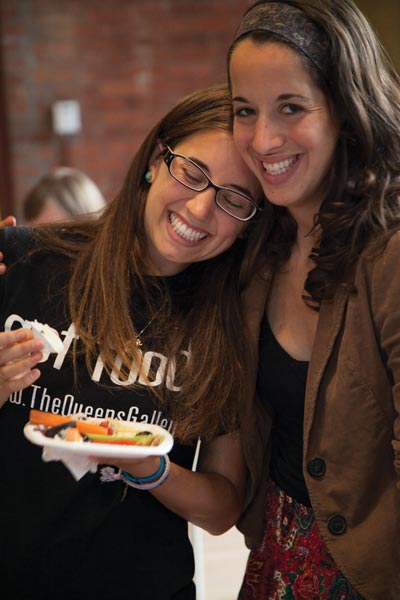Hatching a Plan for Multidisciplinary Learning & Living
It may have been the first time in Vassar’s history that building a chicken coop was a course requirement. But one of the goals of the college’s new cooperative learning program on food and farming is immersing its students in their subject in every conceivable way. And this past fall, that included having fresh, organic eggs for breakfast courtesy of six hens that lived in a newly constructed coop near the Vassar townhouses.

In the fall, two sophomores and six juniors enrolled in the Multidisciplinary Learning-Living Community on Food (MLLC). In addition to living together in a Vassar townhouse, they took three classes on food and food production, worked off-campus in food-related jobs, traveled to off-campus conferences and food production sites, and hosted seminars and other events focusing on farming and nutrition.
Assistant Professor of Anthropology Candice Lowe Swift, one of the program’s three coordinators, says the idea for MLLC was hatched in March 2011 at a Vassar forum on multidisciplinary teaching attended by faculty from 23 colleges.
“We discussed the growing interest among students in food and nutrition—where our food comes from,” Swift says. “We decided this kind of setting, a learning and living cooperative, would accelerate the learning process because the students would be working on the same subject both inside and outside the classroom.”
Swift taught a course on how food systems have developed in different parts of the world and how food production has influenced various cultures. “I’ve taught about food in anthropology courses before, but this one was very different,” Swift says. “We talked about how various food systems have evolved and discussed the conditions of farm workers, including the migrant workers here in the Hudson Valley.”
Professor of Biology Mark Schlessman had the students study the domestication of plants and animals, and how the use of hormones, pesticides, and fungicides affects the food we eat. “We talked about what happens to the ecosystem when you introduce new genes into organisms,” Schlessman says.

Associate Professor of Geography Mary Ann Cunningham taught a course called “Corn by the Gallon, Milk by the Pound.” “Corn and milk are our two biggest commodities, and we looked at the economic impact of growing them, the demand on water and other resources, and the resulting changes in rural America,” Cunningham says.
In addition to their classwork, each of the students picked a food-related topic for independent research and presented the research results at the end of the semester.
In an interview a few days after they had finished building the chicken coop last fall, the students said they were enjoying living, working, and studying together.
“Living in the same place while being in a program like this really gets our creative juices flowing,” said Yael Schwartz ’15, a biology major from Jerusalem, Israel. “We’ll be at the townhouse cooking dinner and we’ll start talking about a topic we were discussing in class earlier in the day.
“This program has changed the way I look at food, the choices we’re making about what we buy and what we eat,” Schwartz said.
Emily Lansdale ’14, an international studies major from Santa Cruz, California, said she was especially enjoying the discussions with her roommates, who have diverse interests and backgrounds.
“We’re really learning a lot from each other in a short time because we’re sharing so many experiences together,” Lansdale said.

Months later, Swift says she believes the inaugural MLLC program achieved most of its goals. “The students were exposed to a wide spectrum of ideas about the food industry, and as a result, they also have a better understanding of biology, geography, and anthropology.”
In particular, Swift says, the students gained significant insights on a wide range of food-related topics during two events—a September conference hosted by the Glynwood Institute for Sustainable Food and Farming in Cold Spring, New York, and an alumnae/i conference held on food and nutrition on the Vassar campus in October.
Vassar senior Meghan McDermott, intern for the MLLC program, says the conferences gave them “a real sense of what’s happening in the field in the Hudson Valley. There are many forward-thinking people here doing interesting work, so we didn’t have to go far to learn and discuss new ideas about how food is grown and distributed.”
Lansdale, who plans to be a teacher, says the experience had shown her new ways to approach her subject matter. She’s looking forward to exploring alternative methods of teaching that incorporate more “doing.”
“My classroom will definitely include a learning garden and frequent field trips,” she says.
Lansdale also lauded the Residential Life office and other college administrators for supporting the MLLC program. “When I first heard the idea of having chickens, I thought, ‘No way they’ll let us do that,’” she says. “But they did.”
Visit vq.vassar.edu for a video about students in the MLLC program and highlights from the Inaugural Conference on Food and Agriculture held during the fall semester.
